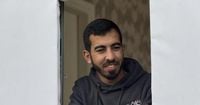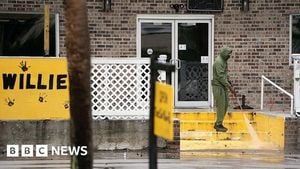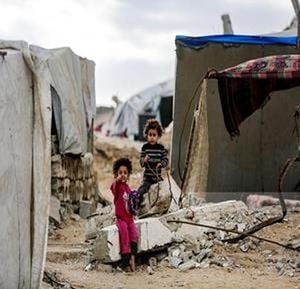Saleh al-Jafarawi, a name that once dominated social media feeds across the Middle East and beyond, met a violent end in Gaza City over the weekend, according to multiple Palestinian and international media outlets. The 28-year-old influencer, better known by his critics as “Mr. FAFO,” was reportedly shot in the head during fierce clashes between Hamas and the powerful Doghmush clan, as Gaza reels from a wave of internal strife following the withdrawal of Israeli forces from much of the territory.
Al-Jafarawi’s death, confirmed by Hamas’s Al-Aqsa TV and reported by outlets such as The Times of Israel, BBC, and Al Jazeera, has become a symbol of the chaos and shifting allegiances now gripping Gaza. Once a prominent voice celebrating Hamas’s October 7, 2023 attacks on Israel, al-Jafarawi’s journey from viral sensation to casualty of internecine warfare underscores the volatility of a region where yesterday’s hero can become today’s victim.
His notoriety began in the early hours of October 7, 2023, when Hamas launched a barrage of rockets and deadly raids into southern Israel. Al-Jafarawi posted a video, grinning and calling it “the happiest day of his life,” as reported by The Times of Israel. But as the Israel Defense Forces (IDF) retaliated with overwhelming force, al-Jafarawi’s tone shifted dramatically. He filmed himself crying in terror as Israeli strikes pounded Gaza, a transformation that pro-Israeli activists quickly seized upon. They edited his celebratory and panicked videos together, coining the moniker “Mr. FAFO”—an acronym for “F*** Around and Find Out.” The nickname stuck, and so did the controversy.
Al-Jafarawi’s social media presence ballooned. By 2025, he had amassed millions of followers, including three million on Instagram alone. His feeds were a dizzying carousel of roles: one day a gun-waving Hamas militant, the next a journalist in a blue “press” vest, then a blood donor, a patient at Gaza’s Shifa Hospital, or even a grieving father. “His remarkable ability to appear in every role imaginable—often within the same 24-hour news cycle—made him a legend of modern propaganda,” one social media user quipped, as cited by Al Jazeera.
But not everyone was amused. Lt. Colonel Avichay Adraee, the IDF’s Arabic-language spokesperson, publicly blasted al-Jafarawi in September 2025, calling him “an actor, hypocrite, liar” and accusing him of “profiting off the tragedies of Gaza’s residents.” Al-Jafarawi was frequently accused of staging videos, including faking injuries from Israeli strikes and even his own death—only to reappear in subsequent clips. Rumors of his demise became a running joke, with one commentator sarcastically suggesting, “Services will be held simultaneously in five locations, depending on which version of him is trending.”
Yet behind the satire lay serious allegations. Social media reports accused al-Jafarawi of pocketing millions in donations ostensibly raised for Gaza’s suffering residents. His critics claimed he was “using his notoriety for self-enrichment,” as reported by Breitbart News. And while some pro-Palestinian voices mourned his death, blaming “Israeli collaborators” for his murder, others saw it as the inevitable outcome of a man who had made enemies on all sides.
The circumstances of al-Jafarawi’s death are as murky as his online persona. According to Al Jazeera, he was shot by members of an armed militia while covering fighting in the Sabra neighborhood of Gaza City, clad in a press flak jacket. Footage circulating online showed his body lying on the back of a truck. Hamas’s Al-Aqsa TV confirmed that he was killed by an anti-Hamas militia in Sabra, and The Jerusalem Post reported that he was “found shot in the head,” a detail echoed by several outlets.
His killing comes amid an explosion of violence in Gaza, as rival factions and powerful clans jockey for control in the vacuum left by the departing Israeli military. At least 27 people have been killed in recent clashes between Hamas and the Doghmush family, according to the BBC. The fighting reportedly began when members of the Doghmush clan ambushed Hamas militants shortly after a ceasefire with Israel took effect. In the ensuing chaos, two Hamas fighters—including the son of Hamas’s head of military intelligence—were executed and left in the streets, prompting a brutal armed raid by Hamas on the clan’s stronghold in Sabra.
Hamas, desperate to reassert its dominance, recalled 7,000 members of its internal security forces to “cleanse Gaza of outlaws and collaborators,” according to Al Jazeera. The group accused some militiamen of being armed by Israel during the conflict, further muddying the already complex web of loyalties and resentments in the besieged enclave.
For many in Gaza, the violence is just the latest chapter in a seemingly endless cycle of displacement and danger. “Residents describe scenes of panic as dozens of families fled their homes under heavy gunfire, many of them displaced multiple times during the war,” the BBC reported. The withdrawal of Israeli forces, which some hoped would bring respite, has instead unleashed a new wave of bloodshed as old scores are settled and new power structures emerge.
Al-Jafarawi’s own reflections on the war, delivered in a January interview with Al Jazeera, now carry a haunting resonance. “Honestly, I lived in fear for every second… not knowing what the next second would bring,” he said. “All the scenes and situations I went through during these 467 days will not be erased from my memory. All the situations we faced, we will never be able to forget them.”
The influencer’s death has sparked a flurry of reactions online, ranging from bitter satire to genuine grief. Some have lampooned his ever-changing roles—“In one week last year he played a doctor, a patient, blood donor, a journalist and a construction worker. In ONE WEEK!!! I really hope the Academy Awards honours him this year,” one user joked. Others, particularly among pro-Palestinian circles, expressed sadness and suspicion, pointing fingers at shadowy collaborators or lamenting the loss of a voice for Gaza.
Yet perhaps the most telling response is the sense of weary resignation that permeates much of the commentary. After years of starring in what some dubbed “Pallywood’s never-ending ‘Israel killed me’ saga,” as one satirist put it, al-Jafarawi’s story ended not at the hands of a foreign army, but amid the internecine chaos of his own homeland. His fate, in many ways, mirrors that of Gaza itself: battered by external enemies, torn by internal divisions, and haunted by the ghosts of wars past and present.
As the dust settles over Sabra and the rest of Gaza City, the legacy of Saleh al-Jafarawi—Mr. FAFO—remains a cautionary tale about the dangers of propaganda, the perils of fame in a war zone, and the unpredictable twists of fortune in a place where survival is never guaranteed.





